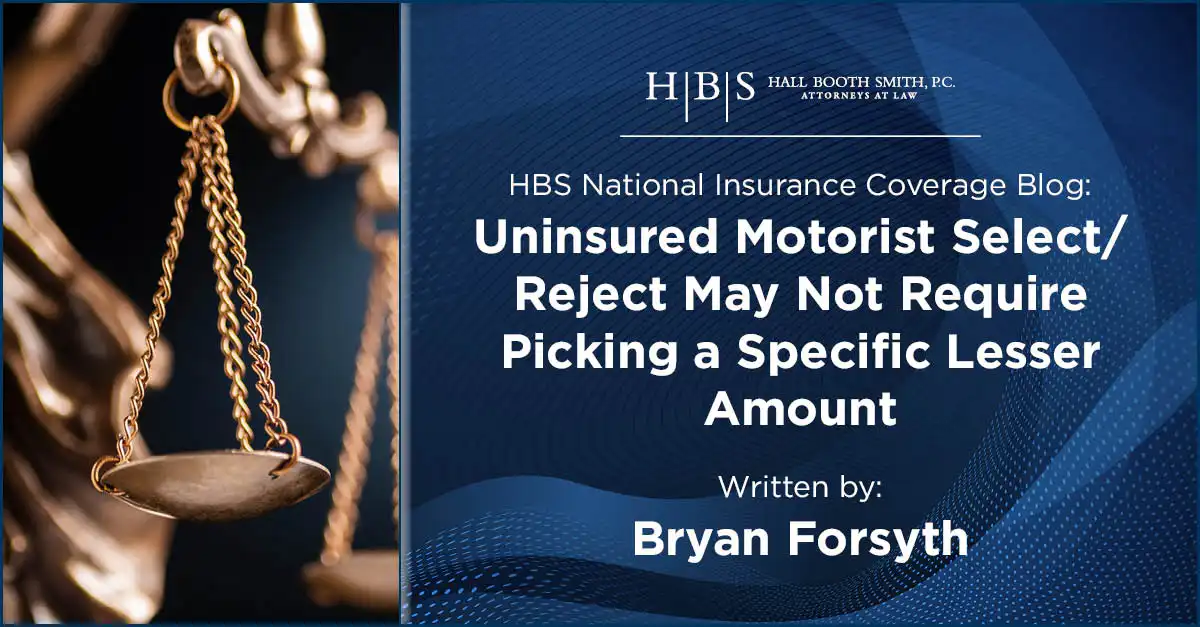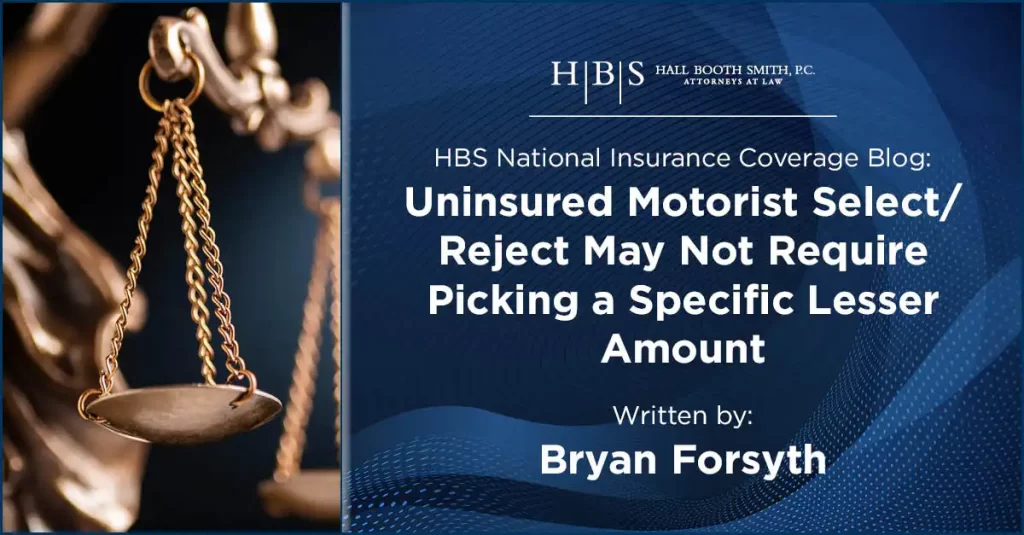
Uninsured Motorist Select/Reject May Not Require Picking a Specific Lesser Amount

Written by: Bryan Forsyth, Esq.
In Jones v. Georgia Farm Bureau Mut. Ins. Co.1, the Georgia Court of Appeals recently affirmed partial summary judgment in favor of Georgia Farm Bureau Mutual Insurance Company (GFB) as to the amount of Uninsured Motorist (UM) coverage provided by its insurance policy issued to Ernie Jones, who died in a car accident. Appellants William and Madison Jones each filed an appeal and collectively presented several arguments seeking $1,000,000 in UM coverage rather than the $25,000 ordered by the trial court.
Background
On January 12, 2015, Jones visited GFB’s office and discussed “insurance matters” with the GFB agent. During this meeting, he made modifications to his GFB policy and signed his name underneath the following statement:
“I affirmatively choose Uninsured Motorist Limits in an amount less than the Limit of Liability for Bodily Injury and Property Damage Coverage.”
Significantly, this one-page signed writing did not provide Jones with an option to select the specific amount of UM coverage desired. Nevertheless, the policy, by definition, incorporates the declaration page as part of the policy, and the declarations page showed that Jones had a $1,000,000 liability limit for bodily injury and a $25,000 UM limit for same.
Appellants argued that Jones never affirmatively selected $25,000 for his UM coverage limit, as required by O.C.G.A. § 33-7-11(a)(1)(B), and thus the Georgia UM statute required that his UM limit default to the same as his liability limit, i.e., $1,000,000. The Georgia Court of Appeals disagreed.
Appeals Court Ruling
In contrast to prior cases McGraw and Morgan, where the Court of Appeals held that “a declarations page showing a UM limit less than the bodily injury limit, standing alone, was insufficient to demonstrate an affirmative choice of a lesser amount of coverage,” the Court of Appeals held in this case that a declarations page showing a UM limit less than the bodily injury limit was able to ‘fill the gap’ when combined with a one-page signed writing showing Jones affirmatively selected a UM limit in an amount less than the bodily injury limit despite the fact that it did not show the amount selected.
While GFB was able to produce some declarations pages sent periodically to Jones and this one-page signed writing, it was unable to produce any document showing that Jones had affirmatively selected any particular amount, be it $750,000, $250,000, or $25,000, for his UM coverage limit. The Court of Appeals held that GFB was not required to produce any such writing because the one-page signed writing described above combined with a declarations page displaying $25,000 in UM limits was sufficient.
“In sum, an insured is charged with ‘awareness of the insurance coverage [he or she] solicited, and with checking the policy to see that proper coverage had been obtained.’ And here, Jones executed an insurance policy in which he signed a statement affirmatively choosing UM coverage in an amount less than the policy’s liability limits, the policy specifically informed Jones that it contained a declaration page detailing the amount of the coverage he selected, and that page established that he chose $25,000 in UM coverage for bodily injury. Considering this evidence as a whole, GFB satisfied its burden of showing that the requirements of OCGA § 33-7-11 (a) (1) (B) have been met, and Jones’s policy provides for $25,000 in UM coverage for bodily injury.”2
Additional Arguments
Appellants made some other arguments not discussed in detail above, including some made by Wallace Miller III. These arguments are worth mentioning both for their substance as well as the fact that Wallace Miller III, who literally wrote the book on Georgia Automobile Insurance Law, presented them. Miller’s main argument was that the UM statute, by default, sets the limit of UM coverage at an amount equal to the policy’s liability limits unless the insurer can satisfy its burden of showing that the insured affirmatively chose UM limits in an amount less than the limits of liability coverage.
Miller argued that “Ernie Jones was neither offered nor rejected UM coverage in an amount equal to the policy’s liability coverage limits, i.e., in the amount of $1,000,000. Because GFB neither offered nor obtained a written rejection of UM coverage in an amount equal to the liability coverage limits contained in the policy, the policy provides UM coverage, by default, in an amount equal to the policy’s liability coverage limits.”
At present, neither the Georgia UM statute nor any appellate decision specifies the form or manner in which automobile insurers must offer UM coverage to Georgia policyholders. While the Georgia UM statute imposes requirements on policies sold in Georgia, it does not impose any requirement on the substance or form of applications for insurance in Georgia.
Miller argued that in this case, GFB was required by law to offer Jones UM coverage and provide Jones the option to reject such coverage or affirmatively select from the minimum coverage up to the limits of liability coverage. He argued that “[i]n the case at bar, it is a question of fact as to whether Ernie Jones was ever provided any such option by GFB. That crucial question of fact is the crux of this case and requires reversal of GFB’s summary judgment.”
According to Miller, whether the insurer fails to make the required offer or whether the insured fails to affirmatively select UM coverage in an amount less than the liability limits, the Georgia legislature intended that the same default provision should apply, that being the default coverage provision of O.C.G.A. § 33-7-11(a)(1)(B). Miller argued that “where the policy purports to limit UM coverage to amounts less than the policy’s liability coverage limits without the insured having affirmatively chosen such lesser amounts, the policy is not in compliance with O.C.G.A. § 33-7-11(a)(1) [citation omitted]. Consequently, this results in the amounts of the liability coverage limits being grafted into the policy, by default, as the policy’s UM coverage limits.”
The one-page document signed by Jones and relied on to ‘fill the gap’ by the appellate court was, as argued by Miller, deficient for several reasons and, at the least, created a fact issue sufficient to defeat summary judgment. Given this document’s deficiency, Miller argued that “the default coverage provision – O.C.G.A. § 33-7-11(a)(1)(B) – when triggered, is read into the policy by operation of law and engrafts into the policy uninsured motorist coverage with limits equal to the liability coverage limits of the policy.”
Miller also noted that with the passage of the 2001 amendment3, Georgia’s public policy was extended to include a requirement of written rejection of UM coverage equal to the policy’s liability coverage limits “to encourage, without requiring, drivers to elect to carry the [maximum] amount of UM coverage.”
These public policy concerns are completely absent in the case at bar. First, it is factually questionable whether Ernie Jones was ever notified about the UM coverage options available to him. And, second, there is absolutely no evidence that GFB encouraged Ernie Jones to carry the higher option of UM coverage.”
Conclusions
Significantly, this case may be seen by some as shifting some of the burden, which was historically placed on the insurer to convey effectively the opportunities and options of UM coverage available to its insured through the written selection/rejection requirements of the UM statute, to the insured to ‘be aware’ of his coverage and ‘check the policy documents’ to ensure that the proper coverage was actually obtained.
Citations
1. Jones v. Georgia Farm Bureau Mut. Ins. Co., 367 Ga. App. 35 (2023)
2. Jones v. Georgia Farm Bureau Mut. Ins. Co., 367 Ga. App. 35, 44, 885 S.E.2d 13, 22 (2023)
3. Georgia Laws 2001, p. 1228
Disclaimer
This material is provided for informational purposes only. It is not intended to constitute legal advice nor does it create a client-lawyer relationship between Hall Booth Smith, P.C. and any recipient. Recipients should consult with counsel before taking any actions based on the information contained within this material. This material may be considered attorney advertising in some jurisdictions. Prior results do not guarantee a similar outcome.


Leave a comment
You must be logged in to post a comment.